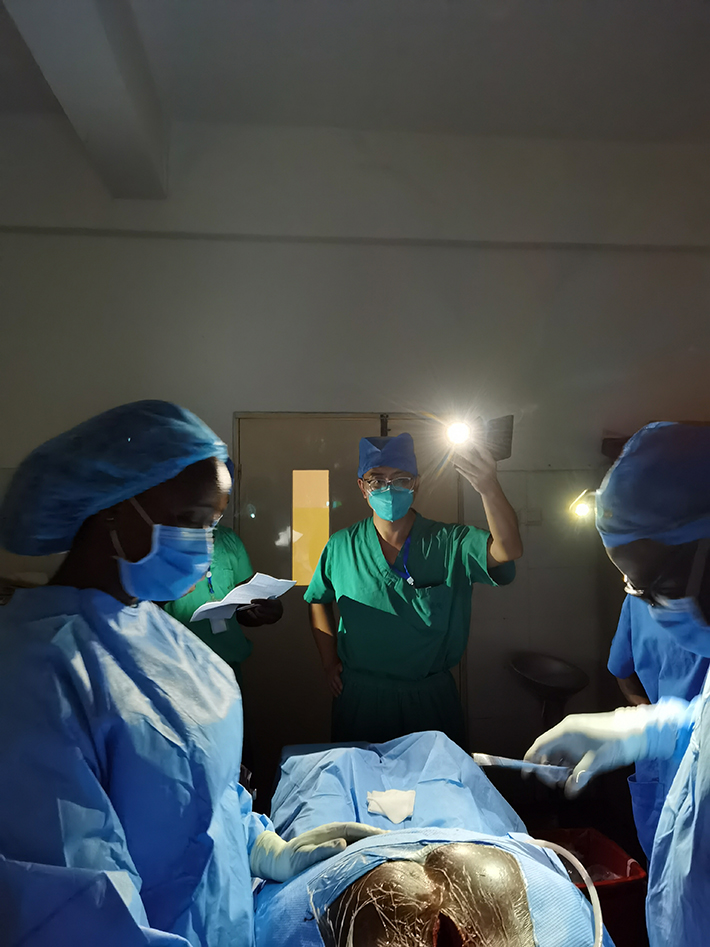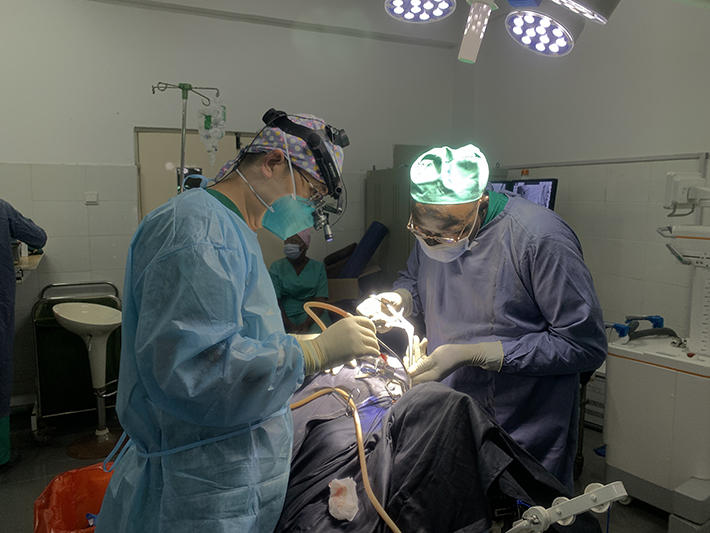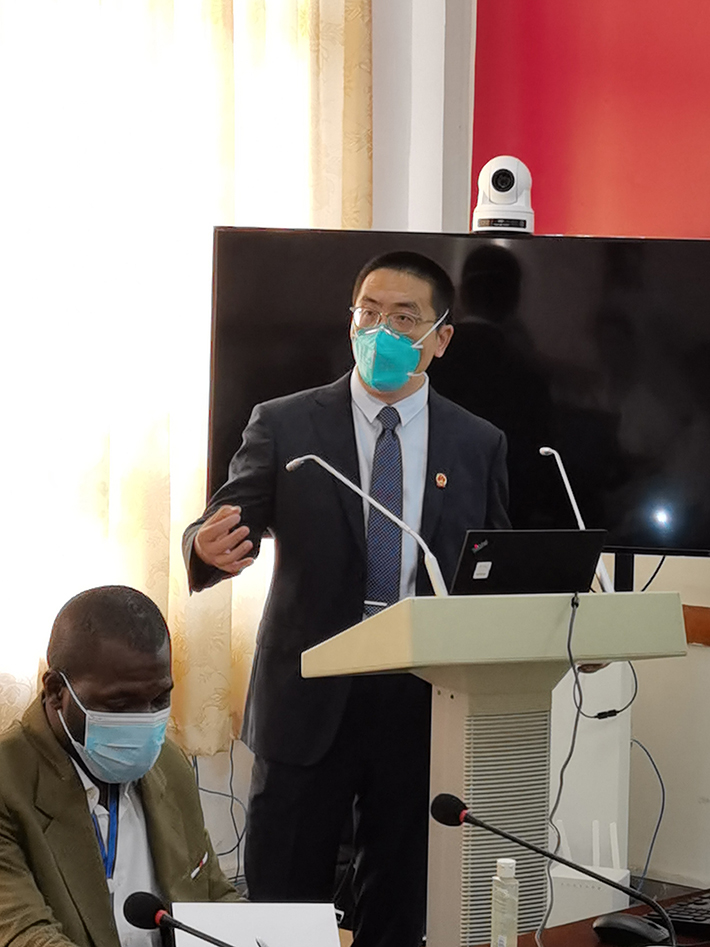|
||||||||||
| Home Nation World Business Opinion Lifestyle ChinAfrica Multimedia Columnists Documents Special Reports |
|
||||||||||
| Home Nation World Business Opinion Lifestyle ChinAfrica Multimedia Columnists Documents Special Reports |
| ChinAfrica |
| Nerves of Steel, Heart of Gold |
| The unwavering commitment of a Chinese neurosurgeon on African soil |
| By Li Xiaoyu | VOL. 16 March 2024 ·2024-03-27 |

Wang Xingwen (right) performs a surgery using a torch because of power cuts in Guinea (COURTESY)
Wang Xingwen, a 49-year-old neurosurgeon at the Xuanwu Hospital affiliated to Capital Medical University, is completing the final operation of the Year of the Rabbit. He must ensure his patient is in a stable post-operative state before he can purchase his train ticket to join his family in Shandong Province for the Lunar New Year. Due to his demanding career over the last 24 years, Wang has become accustomed to solitude during important festivities.
However, the Spring Festival of 2021 was particularly challenging for him. In September 2020, he began his 18-month foreign aid medical mission as a member of the 28th batch of Chinese medical aid team in Guinea.
In his career, Wang has performed over 4,000 surgical operations, sometimes working up to 22 hours at a time on cases of exceptional complexity. Out of the 640 operations he performed in 2023, only two resulted in failure. According to him, in neurosurgery, there is no margin for error, as a single mistake can cause permanent damage. Therefore, the focus should be on improving the chances of success and minimising the risks of failure. It was this dedication that led him to his mission in Africa.

Wang Xingwen (left) guides a Guinean doctor during a surgical procedure (COURTESY)
Angels in white
With 10 months of preparatory training, Wang gained a good understanding of the French language, Guinean national conditions and diplomatic protocol, which gave him the confidence to face the challenges ahead. However, upon arriving in the capital Conakry, he faced extreme heat and humidity, mosquito bites, and the danger of poisonous snakes. His commitment and resilience were severely tested. During his breaks, Wang would climb a water tower to admire the sea and reflect on his family in silence. Despite the challenges he faced, he remained dedicated to his humanitarian mission, recognising that he was both a caregiver and a representative of friendship.
Over the course of 18 months, Wang conducted more than 100 surgical operations. These procedures were often performed under challenging conditions, with frequent power cuts during the dry season. Additionally, he treated patients suffering from deadly diseases and gunshot wounds during times of political unrest. These experiences exceeded the initial expectations of the mission.
In June 2021, an impressive operation was performed at the China-Guinea Friendship Hospital on a patient who had suffered a fracture of the thoracic and lumbar vertebrae. The procedure was performed by Wang and local doctors. Unfortunately, an unexpected acute haemolytic reaction occurred, which put the patient’s life at risk. After confirming possible malaria, the medical staff administered an injection of artemisinin to stabilise the situation. Despite difficult working conditions and an operation lasting over 10 hours, the medical staff continued to work tirelessly to save the patient. At the end of the day, Wang was deeply moved to discover that his colleagues were waiting for him with a hot meal, a sign of their support and solidarity.
Filling medical gaps
Before the medical team arrived, the China-Guinea Friendship Hospital had a basic neurosurgery department. Wang saw this as an opportunity to advance microscopic neurosurgery in Guinea, aiming to narrow the gap between local and international standards and accelerate the development of this crucial specialty in the country.
The hospital had only one operating microscope, which was donated by China 10 years ago. Thanks to Wang’s intervention and the assistance of Chinese engineers, the microscope was refurbished. It was then used to perform a minimally invasive operation for a patient with cervical spine fracture. The patient’s mobility showed significant improvement two days later, and on the fourth day, he was able to get out of bed. Local doctors were impressed by the speed of the patient’s recovery using a microscopic neurosurgery technique characterised by a small incision, minimal trauma and rapid recovery.
The efficiency of the operation particularly impressed a Guinean assistant who expressed a desire to learn the technique. The head of the neurosurgery department also called for the adoption of Chinese methods in Guinea after observing several successes in microscopic neurosurgery.
Wang notified the relevant departments in China about the situation and received significant support from the Xuanwu Hospital. The Beijing Ling Feng Foundation generously donated complete training equipment, which was then shipped to Guinea. The medical team assembled the equipment, established the first local neurosurgery laboratory, and compiled the training material in French. In July 2021, after six months of preparation, the first Guinean training workshop in microsurgery was held. Local doctors have been trained to use microscopes for surgical operations skilfully. “While providing much-needed medical assistance, we have also passed on treatment methods to enable local medical personnel to continuously improve the efficiency and quality of local medical services,” Wang said.

Wang Xingwen makes a presentation in neurosurgery in French during his mission to Guinea (COURTESY)
Capacity building
The medical team also organised a forum of neuroscience experts in Guinea, covering a wide range of disciplines such as neurosurgery, cardiology, resuscitation, pathology and anaesthesiology. As French is the official language of Guinea, Wang chose to teach in that language. To ensure accuracy, he created slides in English, which were then translated into French and checked by a French teacher online. Wang spent two to three hours each evening learning his notes in French, investing more than 200 hours on preparing a 40-minute presentation. He found this task is surprisingly more arduous than the surgical practice itself.
After 18 months of hard work, the medical team has achieved its goals. They have trained local neurological talent, upgraded their technology, purchased equipment worth 4.5 million yuan (about $626,000), and established 13 medical standards and systems, which have been compiled. In January 2022, the Guinea Neuroscience Centre was formally launched. This occurred just before the departure of the Chinese aid team.
Because of the difficulties he faced and the bonds he forged with the Guineans, Wang was able to avail the chances for personal and professional development that came his way during this mission. He stays in regular touch with them and receives messages of good wishes often. He feels that the core of his job is to convey the friendliness and generosity of the Chinese people, and he views himself as an ambassador for such a role.
|
||||||||||||
| About Us | Contact Us | Advertise with Us | Subscribe |
| Copyright Beijing Review All rights reserved 京ICP备08005356号-5 京公网安备110102005860号 |